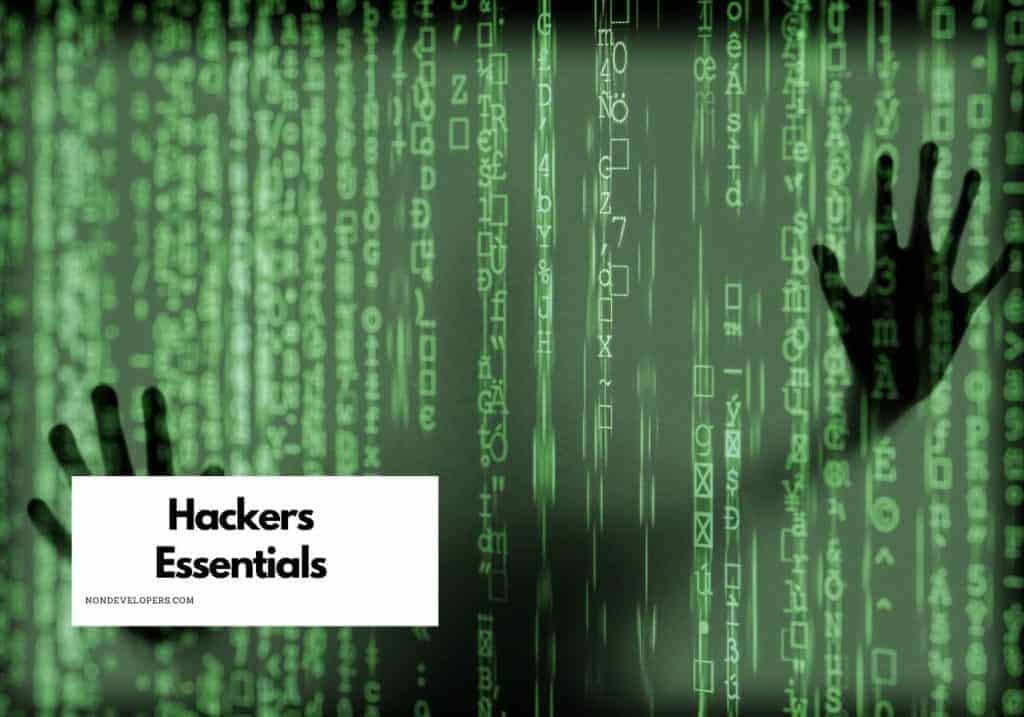Hackers Essentials
Hacking, what started as teenage mischief and has now turned into one of the most profitable businesses in the world. Since you are here I assume you aspire to become a part of this industry and want to be a hacker as well but don’t know how to. If that’s the case, you have come to the right place.
In this article, find out all that you need to be a pro hacker, from the beginning till your destination.
Type Of Hackers
Based on the primary purpose, there are three types of hackers
- Black hat hackers or the bad guys –Their purpose is to gain illegal access to data and information
- White hat hackers or the good guys –They work for organizations to strengthen their securities and fight malicious activities
- Grey hat hackers or alerting hands –These hackers analyze the strengths and weaknesses of a system and provide them to the authorities to improve.
Before diving into the skills required to be a hacker you must decide the type of hacker you want to become. It will give you a clear path to the final hacking level you have to achieve.

Skills Required To Be a Hacker
Hacking is one of the most proficient IT disciplines that require dozens of IT skills, and techniques. These requirements vary from stage to stage as you move from scratch up to mastering the field. Hence, the skills mentioned below are divided into three sections: basic, intermediate, and soft skills, so you can easily plan out your course of action at each level.
Let’s start with the basics.
Basic skills for a hacker
These are the fundamental skills that hackers must have from the very beginning. They form the basis for further skills, promoting you to the next level in hacking.
· Primary Computer Skills
Needless to say, hacking requires some basic computer skills. Do not mistake these skills by creating a Word document or cleaning your browsing history; it goes way beyond that. You must be capable of editing the registry, using the operating system command line, and setting up the networking parameters.
· Networking Skills
Hacking requires tons of networking skills, some of which are listed below
DHCP –Dynamic Host Configuration Protocol is a networking protocol applied on an IP network to automatically assign each host an IP address and other specifications required to establish a network for efficient communication.
NAT –Network Address Translation is the process of changing an IP address into another IP address by altering the information in the IP header before the packets are forwarded to another routing device.
Subnetting -It is the process of creating a network within a network to allow traffic to reach its destination without having to move through useless routers.
IPv4 -4th version of the internet protocol; it is one of the primary protocols of basic networking.
IPv6 –It is the latest version of internet protocols.
DNS –Domain Name System is the heart of the internet, responsible for matching the connection names to their IP address.
Routers and Switches –Devices used for forming network connections
VLANs –The term for a group of devices based on different LANs set up to communicate like they were linked through the same wire.
Public and Private IP –Public IP address is accessible over the internet while a private IP address is protected from exposure on the internet.
OSI model –Open System Interconnection Model is a configuration describing the purpose of a networking model.
MAC Addressing –MAC address is used to identify a LAN-based computer and is essential for IP and TCP to function.
ARP –Address Resolution Protocol is used for identifying MAC addresses and other such link-layer addresses typically associated with IPv4.
· Linux Skills
Becoming a hacker today requires you to go beyond Windows and explore the Linux world. Since most the hacking tools are designed on Linux, developing Linux skills is essential for every hacker. Moreover, Linux is a popular operating system among hackers for its greater control and strength of security.
· Wireshark and Tcpdump
Wireshark is the most common protocol analyzer around the world. It enables you to capture packets moving through an interface or a network connection such as between your home and office computers.
Tcpdump is a protocol analyzer based on a command-line interface. Both of these protocols allow hackers to analyze TCP and IP attacks and traffic.
· Virtualization
Virtualization software, including VirtualBox, ESXi, VMware Player, and VMWare Workstation all provide a safe environment for a virtual hacking lab before jumping into the real hacking world. They allow you to practice your skills until you are ready to finally start launching attacks. Once you are proficient with these software applications you can easily deal with the most challenging hacking levels.
· Security Technologies
To trespass the security system you have to thoroughly understand their working. Some of the most common security systems to practice are Secure Socket Layer (SSL), Public Key Infrastructure (PKI), and Intrusion Detection System (IDS) like NIDS, VMIDS, firewalls, etc.
· Wireless Technologies
Like security systems, you must be proficient with wireless technologies in order to hack them. Wireless technologies are usually based on WPS, the four-way handshake, and encryption algorithms like WEP, and WPA. Moreover, you’ll need a profound knowledge of protocols used for authentication and connection along with other legal restrictions on the technologies to hack.
Intermediate Skills
Once you have mastered all the basic skills, you can move up to intermediate skills. This the most crucial stage in your hacking journey, where you actually start to see your capabilities.
· Scripting Skills
Scripting skills refer to learning scripting languages like Python, Perl, Ruby, and others required to develop your own tools. Without these skills, you’ll be dependent on tools introduced by others, which can immensely limit your pace. Due to the rapid availability of highly developed security systems, a new tool is losing its place in the hacking world almost every day, making it essential for you to design specific tools according to your needs.
· Database Skills
To smoothly hack databases, you need to know how they work. They are designed using SQL language which is a domain-specific programming language. Acquiring command over primary database management systems such as Oracle, SQL Server, and MySQL can also be beneficial in different situations.
· Web Applications
Web applications form the easiest, the most accessible, and the most flexible hacking grounds in the present day. The better you understand web applications and the relational databases working behind them, the more successful hacker you can be. Also, you might need your own website for phishing and other such purposes, which is better to develop on your own.
· Forensics
In order to not break the rule, you first need to know the rules! Digital forensics is becoming stricter regularly due to increasing cybercrimes. If you want to hack without getting caught, you must be well aware of the rules and methods used to track crimes. That’s the only way you can prevent detection and in the long run, prison.
· Advanced TCP/ IP
TCP and IP basics are sufficient for beginners, but for intermediate hackers a detailed insight is essential. It includes knowledge of how the fields, including window, tos, flag, ack, etc. in IP and TCP packets can be exploited ad utilized against the targeted system in launching man-in-the-middle attacks.
· Cryptography
Cryptography also known as cryptology is the study and practice of techniques that ensure secure communication between systems while preventing the adversaries –the third parties from accessing the data.
Although practicing cryptography is not essential, it is highly significant for defeating the cryptographic algorithms that protect the data. The better you understand the strong and weak points of these algorithms, the more you’ll be able to utilize them for your good. Cryptography also helps hackers hide their activities from security systems and detectors.
· Reverse Engineering
Reverse engineering is like dissecting and operating malware; you can cut it open, edit the existing properties, and add new features. It saves you from having to build new applications entirely on your own, neither is it preferred in the hacking world. Almost every malware is built upon a previous one.
Soft Skills
Soft skills are important for hackers to practice at each level. They are essential to succeed in almost any field. Some of the most important soft skills for hacking are given below.
· Creativity
Creativity has always been the secret to unique and better outcomes. Hacking a system takes more than just following a few set of rules and language instructions. It requires a high degree of creativity that can help you discover multiple ways to do the same thing.
· Problem-Solving
A hacker comes across tons of challenges and problems that require him to have strong problem-solving skills and analytical thinking. These skills help diagnose the exact problem and come up with the right solutions.
· Persistence
Persistence is to keep moving forward even with the strongest urge to quit; the main purpose is to keep learning throughout the process, especially from failure, and utilize the lessons learned to build further skills and understanding.
It is a skill crucial to a hacker as they face countless failures before they can finally get to their destination. It takes indefinite tries and methods to find the right one. If a hacker is not persistent, he’ll probably throw in the towel in the first few tries.

Hardware Skills Required To Be A Hacker
With the development in the field of hacking, there are frequent hardware discoveries. Hence, with the skills mentioned above, a hacker also needs some hardware skills. Some of the most common hardware devices are discussed below.
Hardware To Become A Hacker
· Hak 5 WiFi Pineapple Nano
WiFi Pineapple Nano is one of the cheapest hacking devices by Hak5. It is compatible with Windows, Linux, and iOS. Wifi Pineapple Nano is a highly sought-after device for setting up a rogue access point –an unauthorized linkage established on a secured network.
The device is also effective in launching man-in-the-middle attacks by corrupting the network between a device and a wifi network. The Pineapple acts as the actual internet connection to pry on the data while relaying it between the device and the wifi network. The device’s external antenna on the device is an effective speed booster. There are several other versions of the device, including Hak5 Wifi Pineapple Tetra and Wifi Pineapple Tetra Basic, though they are relatively expensive.
· TP-Link Nano USB Dongle
Pre-built wireless adapters in laptops and computers are not sufficient for cracking wireless technology. Hence, a hacker must buy a wireless adapter to efficiently hack wifi passwords. TP-link Nano USB Dongle is one of the most recommended wireless adapters to test wifi penetration ability. It is compatible with Windows, Linux, and MAC.
Although it is quite cheap, it boosts performance more than other expensive penetration testers.
· Tupavco TP512 Yagi Wifi Antenna
If the regular wifi antennas are not effective, you need to switch to a long-range wifi antenna. A long-range antenna increases your range and coverage, allowing you to hack routers at a longer distance.
With Tupavco TP512 Yagi Wifi Antenna, users have reported a range as far as 300 ft. and even to up to 1 mile, though unobstructed. You can also check out another similar model ALFA Yavi Wifi Antenna, which includes a hacking chipset and a cable adapter.
What are the Steps to Becoming a Successful Bank Hacker?
Becoming a successful bank hacker requires a meticulous approach and specialized skills in hackers and bank security evasion. Step one involves acquiring an in-depth understanding of banking systems and their vulnerabilities. Step two entails mastering hacking techniques and tools, such as phishing, malware, or social engineering. The next step is to identify potential targets and assess their security measures. Then, exploit any weaknesses found, gaining unauthorized access to sensitive information. Finally, successful hackers cover their tracks, ensuring their actions go undetected, and evade bank security systems.
Conclusion
To become a hacker you need truckloads of skills, though once you are in the field you need to stay persistent and keep yourself pushing through every step for guaranteed success. Keep looking for newer and better ways to do old every task and come up with methods of your own. You now have a clear idea of where you can start or what more do you need to improve your current skills. While you move along skills do not forget to choose the right hardware devices –there is no way you can hack with a spoon!





0 Comments